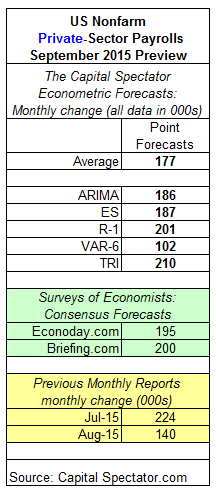Private nonfarm payrolls in the US are projected to increase by 177,000 (seasonally adjusted) in Friday’s September report from the Labor Department, based on The Capital Spectator’s average point forecast for several econometric estimates. The prediction reflects a modest improvement over the weak 140,000 gain in August.
Two estimates based on recent surveys of economists point to a higher gain for private payrolls in September relative to The Capital Spectator’s average projection.
Here’s a review of the numbers, followed by brief summaries of the methodologies behind the forecasts that are used to calculate The Capital Spectator’s average prediction:

ARIMA: An autoregressive integrated moving average model that analyzes the historical record of private payrolls in R via the “forecast” package.
ES: An exponential smoothing model that analyzes the historical record of private payrolls in R via the “forecast” package.
R-1: A linear regression model that analyzes the historical record of ADP private payrolls in context with the Labor Department’s estimate of US private payrolls. The historical relationship between the variables is applied to the more recently updated ADP data to project the government’s estimate of private payrolls. The computations are run in R.
VAR-6: A vector autoregression model that analyzes six economic time series in context with private payrolls. The six additional series: ISM Manufacturing Index, industrial production, aggregate weekly hours of production and nonsupervisory employees in the private sector, the stock market (Wilshire 5000), spot oil prices and the Treasury yield spread (10-year less 3-month T-bill). The forecasts are run in R with the “vars” package.
TRI: A model that’s based on combining point forecasts, along with the upper and lower prediction intervals (at the 95% confidence level), via a technique known as triangular distributions. The basic procedure: 1) run a Monte Carlo simulation on the combined forecasts and generate 1 million data points on each forecast series to estimate a triangular distribution; 2) take random samples from each of the simulated data sets and use the expected value with the highest frequency as the prediction. The forecast combinations are drawn from the following projections: Econoday.com’s consensus forecast data and the predictions generated by the models above. The forecasts are run in R with the “triangle” package.
Which stock should you buy in your very next trade?
AI computing powers are changing the stock market. Investing.com's ProPicks AI includes 6 winning stock portfolios chosen by our advanced AI. In 2024 alone, ProPicks AI identified 2 stocks that surged over 150%, 4 additional stocks that leaped over 30%, and 3 more that climbed over 25%. Which stock will be the next to soar?
Unlock ProPicks AI